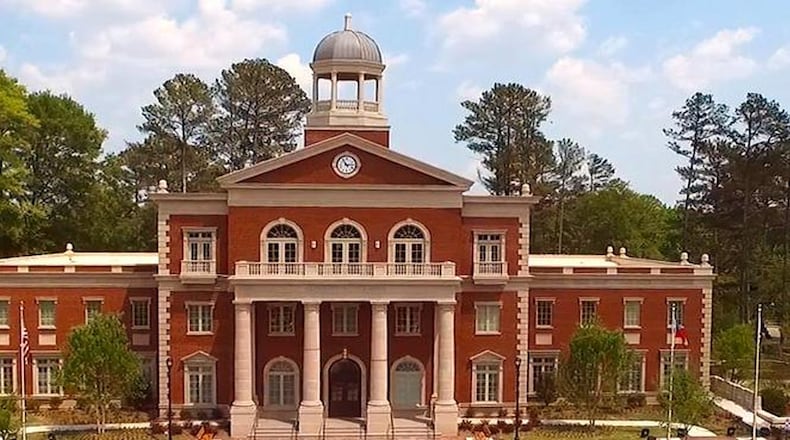Alpharetta is discussing changes in its property taxes that could help fund bonds to pay for a list of projects the city needs. But some councilmembers see the tax plan as a threat to the city’s existing businesses.
Alpharetta plans to increase the homestead tax exemption for homeowners — raising the amount removed from the assessed value of a home from $45,000 to $52,500.
At the same time, the city plans to increase the property tax rate to cover the cost of a bond issue to fund a list of projects that the city has not finalized. The home exemption increase is intended to offset the slight increase in the property tax rate.
The plan, which favors homeowners over businesses, has split the council. Council members voted 4 to 3 to approve the change to the city’s homestead exemption at a council meeting Feb. 3. Mayor Jim Gilvin voted against the change, arguing it will result in higher taxes for commercial and business property owners that could drive some of them out of the city.
“This sends a terrible message to the business community,” he said. “I know of two employers who are contemplating whether they are going to stay.”
The homestead exemption applies only to homeowners whose Alpharetta home is their primary residence. Commercial property owners and homeowners who rent out a second residence, or perhaps use a residence as a secondary home, do not have the benefit of the exemption. Gilvin and opposing councilmembers believe commercial property owners and landlords are likely to raise rents and services when they receive a higher tax bill.
READ | Winning $10K Mega Millions ticket sold in North Fulton
READ | Sandy Springs seeks comment on shopping center makeovers
Because all homestead exemption changes must be approved by the Legislature, the city has asked Rep. Chuck Martin R-Alpharetta to put the request before lawmakers during the ongoing session. If legislators agree, it would be put before voters for approval in November.
Councilmembers discussed details of what a bond sale might fund during a City Council work session Monday night. Some of the 40 projects being considered included aesthetic improvements to Webb Bridge and Kimball Bridge overpasses on Ga. 400 at a cost of at least $9 million; restoration of Wills Park for $2.5 million; and sidewalks for the North Point Mall corridor for $10 million.
“We believe there are enough projects without an adequate revenue source to move forward, and put it in the eyes of the voters,” said councilmember Ben Burnett. “If they (voters) don’t want to approve a project list that we can come to a consensus on, I’m willing to alter the millage rate by less.”
“My objective here is to represent the homeowners in the city of Alpharetta. I am fine with looking the commercial property owners in the eye and saying, ‘Your employee base comes from other parts of the greater metro area. They tear up our roads.’ I think the residents here deserve to have the first bite of the apple,” Burnett said. “And I’m fine with that.”
Using existing millage rates, an Alpharetta homeowner would save $36.15 on their property taxes if the additional $7,500 homestead property tax exemption were to be approved, according to James Drinkard, assistant city administrator. “The savings is the same regardless of the value of the home,” he said.
An increase in the property tax rate has been suggested by Burnett. If approved, homes with a fair market value of $400,000 or less would have no annual increase in tax assessed. Homes with a fair market value of $500,000 to $900,000 would have an annual increase ranging from $9 to $49.
While the city hasn’t settled on what projects a bond issue might pay for, residents complain that businesses aren’t paying their fair share toward road work and other necessary city infrastructure.
Resident Clifford Martin complained that profitable corporations based in Alpharetta don’t pay towards infrastructure improvements. “I would like to see for once that homeowners get protected against the tax increase.”
Mayor Gilvin argues that corporations and commercial property owners might balk at an increased tax burden. Businesses currently pay 62 percent of the city’s property taxes.
“Tell North Point Mall while we are trying to get them to invest in their facility that we are going to increase their property taxes. And to all the other businesses along the North Point corridor, as well.”
Lowering a home’s taxable value should lower its tax bill, but will also reduce the city’s property tax income. If approved, this will be the third homestead exemption increase to be approved in the past year. Taken together, the exemptions add up to $2.5 million taken out of the city budget, according to Councilman John Hipes. Hipes voted against the most recent increase in homestead exemption along with Gilvin and councilmember Dan Merkel.
The benefit of the homestead exemption is minimal to homeowners compared to the impact on services, said Merkel. “You’re not changing their life, but you cost me three firemen,” he told fellow councilmembers. “That adds up to $300,000 per year.”
During his State of the City Address at Hotel Avalon on Feb. 13, Gilvin called on Alpharetta residents to become educated on the city’s homestead exemption issue. “Let’s keep the political realm from turning negative like other communities. Alpharetta has a stake in this game.”
About the Author
Keep Reading
The Latest
Featured


